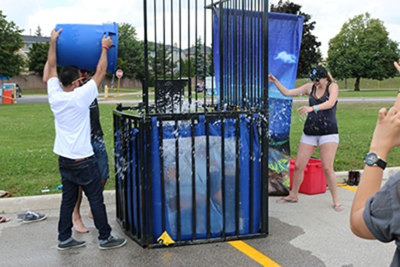Striking out against ALS
STORY BY DANA BOYINGTON
PHOTOS BY JONATHAN FERGUSON
Before you dunk that bucket of water of ice-cold water on your head, ask yourself, “Why am I doing this?”
The ALS Ice Bucket Challenge has raised millions for research and inspired thousands of online videos in just six weeks.
The first week of August, Pete Frates, a former Boston College baseball captain diagnosed with amyotrophic lateral sclerosis (ALS) at age 27, created the challenge to raise money and awareness for ALS.
“ALS is a disease that affects people in the prime of their life. It hits people out of nowhere and two-five years later they die,” says Laurie Laxer, GTA regional manager for ALS Canada.
The fatal neurogenitive disease, ALS attacks the spinal cord and can stop control over movements, like raising a hand, according to ALS Canada. Eventually, the body will become paralyzed and swallowing and breathing become impossible. The disease, although affects the body, does not affect other senses, like the brain.
Thousands of videos have spread via social media, of celebrities and ordinary people taking this challenge, nominating others, while dumping a bucket of ice cold water on their head.
“The ice bucket challenge is amazing for a number of reasons,” Laxer says. “It gets people more aware of the disease and just by watching a video, the public gets curious and want to know more.”
Dr. David Taylor, director of research for ALS Canada, has been “compelled to fix it [ALS]” since he first became aware of the disease.
“When we first heard about the Ice Bucket Challenge we were expecting around like $10, 000 and from the Canadian public alone we’ve reached thirteen million dollars,” Taylor says.
Since the challenge began, there has been some criticism of the videos, and Taylor says, “It’s an unintentionally, simplistic thing– a bit narcissistic in a way. But everyone wants to call out someone and combining that with donating it is an amazing gift.”
Sheridan student Jordan Deschamps participated in the challenge by recreating the ‘I’m the king of the world’ scene from Titanic, and believes the videos can be powerful.
“Words really fail when facing something so life-changing and devastating. All I could say is I hope our silly little video brought ALS even a slight bit of attention, that our donations can help those suffering, and that people continue to be informed and inspired to donate,” Deschamps said in an email.
ALS Canada receives generous donations daily and Laxer has become close with many of those who donate and are diagnosed with the disease.
“Last week, we got a great donation from a young man who started to cry on the phone. And when I asked him why he was crying he said it was because three years ago he lost his mother to ALS and he had been frustrated for years because no one understood,” says Laxer.
Researchers have learned much more about the disease Taylor says, “We’ve gained a lot of momentum. It truly is a wonderful time for ALS research…we’ve come so far in just five years.”
Donations go to many different parts of ALS Canada, including research and support for those with ALS.
“With all the money we’ve raised, we have more money for research and we can provide care for people with ALS,” Taylor says. “A lot of Canadian families go into debt and have to quit their jobs when they are diagnosed.”
With the financial boost, Laxer is optimistic that there is hope for ALS research.
“With all these donations, I believe we can come up with a cure, we have to get a hold on this.”





